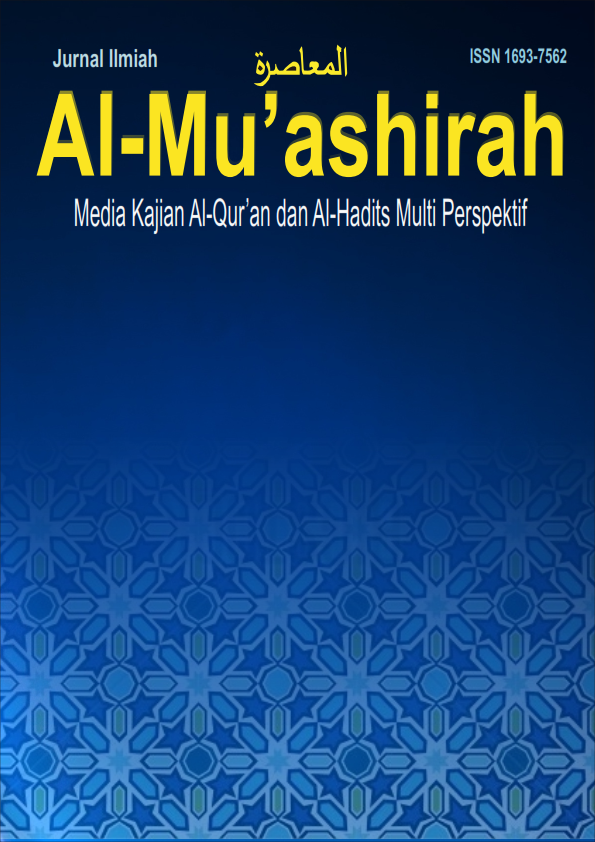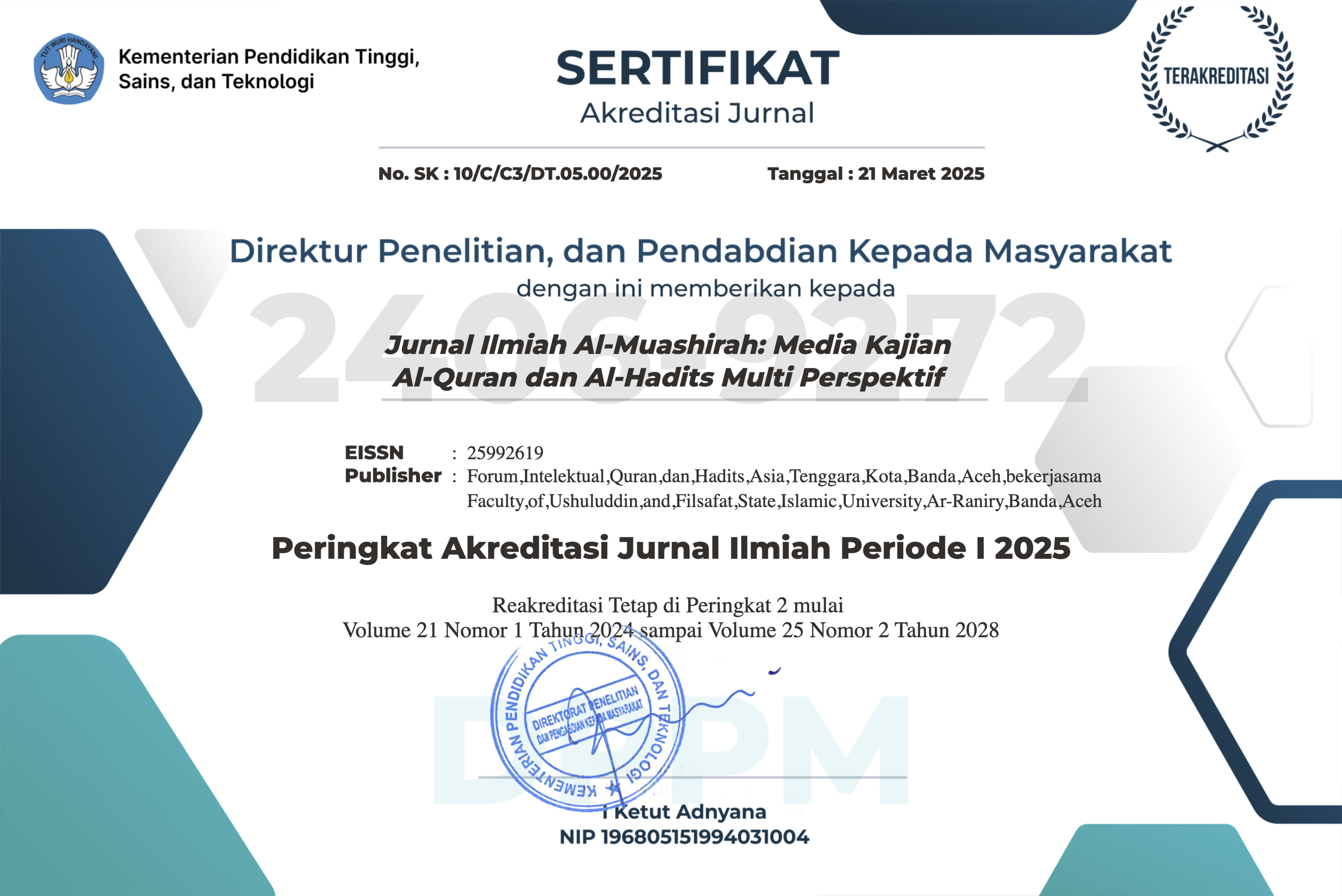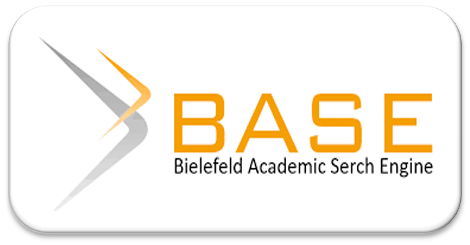Integrating Thematic Tafsir of Qur’an Surah Al-‘Alaq with Local Wisdom-Based Learning Media: An Islamic Education Model for Generation Z in West Sumatra
DOI:
https://doi.org/10.22373/jim.v22i2.31977Keywords:
Learning Media, Qur’anic Values, Local Wisdom, Generation Z, Digital InnovationAbstract
Efforts to develop Islamic learning media that integrate Qur’anic values with local wisdom remain limited, even though Generation Z-as digital natives, and the main users of digital tool- still requires approaches that are relevant to both culturally grounded and religiously relevant. This study examines the philosophy of Adat Basandi Syarak, Syarak Basandi Kitabullah (ABS-SBK) as a framework for aligning local wisdom with Qur’anic values, particularly through the utilization of Qur’anic verses in character building. The research seeks to evaluate the effectiveness of digital learning media, identify the implementation challenges, propose an integration model of the tafseer of Quran surah Al-‘Alaq with ABS-SBK, and analyze its implications for Islamic learning among Generation Z. A qualitative case study was conducted using an in-depth interviews, classroom observations, and documentation. The findings reveal that integrating the tafsir of QS. Al-‘Alaq with the ABS-SBK philosophy fosters student engagement, supports contextualized learning, and reinforces the Minangkabau Islamic cultural identity. Challenges include infrastructure limitations, educators’ technological skills, and content validation processes. The proposed model combines thematic tafsir with ABS-SBK-based multimedia content, enhanced through gamification and digital storytelling. This study highlights the importance of collaboration among scholars, educators, and technology developers in designing innovative and value-based Islamic learning media for Generation Z.
Downloads
References
Achjar, K. A. H., A. Rusliyadi, M., Zaenurrosyid, N. A. Rumata, I. Nirwana, and A Abadi. Metode Penelitian Kualitatif: Panduan Praktis Untuk Analisis Data Kualitatif Dan Studi Kasus. PT. Sonpedia Publishing Indonesia, 2023.
Adawiyah, Rabiatul, Lukmanul Hakim, and Asep Abdurrohman. “Implementasi Pembelajaran Gamifikasi Disertai Video Untuk Meningkatkan Pengetahuan Sejarah Peradaban Islam Siswa” 4, no. 2 (2024): 133–45.
Afifullah, H Muhammad, S E Anis Fitria, Aulia Subita, Dian Afrilia, Mar’atush Sholihah, S H I Siti Ma’rufah, Ahmad Taufiq Hidayatur Rohman, M Iqbal Qomaruzzaman, Mohammad Syamsud Dhuha, and Muhammad Fadhly Robby. Bingkai Pendidikan Islam Dalam Perspektif Studi Al-Qur’an Dan Hadits Tarbawy. Deepublish, 2024.
Ahmad, Khalilullah Amin, Fathullah Asni, Muhamad Husni Hasbulah, Hasrul Hashom, Wan Azani Mustafa, Afiffudin Mohammed Noor, Syahraini Tambak, and Khairulnazrin Nasir. “Mobile Learning of Islamic Studies: A Comprehensive Review.” Journal of Advanced Research in Applied Sciences and Engineering Technology 48, no. 2 (2025): 211–24.
Akhyar, Muaddyl, and Aisyah Syafitri. “THE CONCEPT OF EDUCATORS IN AL-QUR’AN SURAH AL-ALAQ VERSES 1-5 (STUDY OF TAFSIR AL-MARAGHI BY MUSTAFA AL-MARAGHI).” In Imam Bonjol International Conference on Islamic Education (IBICIE), 421–31, 2023.
Albert, Albert, Iswantir Iswantir, Fauzan Ismail, and Zainir Zainir. “Gagasan Integrasi Nilai-Nilai Adat Basandi Syarak Syarak Basandi Kitabullah (ABS-SBK) Kedalam Pelajaran Pendidikan Agama Islam Pada Kurikulum Sekolah Dasar.” Jurnal Pendidikan Indonesia 3, no. 11 (2022): 1002–13.
Aldi, Muhammad, and Akhmad Nurul Kawakib. “Reconstruction of Islamic Education Philosophy in Minangkabau Customary Values: Actualizing the Principles of Adat Basandi Syarak, Syarak Basandi Kitabullah.” JIIP-Jurnal Ilmiah Ilmu Pendidikan 8, no. 2 (2025): 1548–57.
Aulia, Qithrotun Nida, Sholahuddin Al Ayubi, and Salim Rosyadi. “Critical Thinking Dalam Al-Qur’an: Studi Tafsir Tematik Dan Implementasinya Di Era Digital.” Al-Fahmu: Jurnal Ilmu Al-Qur’an Dan Tafsir 4, no. 1 (2025): 131–49.
Basyiroh, Umi, Akhmad Arif Musadad, Moh Muchtarom, and Abu Zarrin bin Selamat. “Systematic Review: Android-Based Interactive Learning Media to Enhance Understanding of Islamic Education in Support of SDGs.” Profetika: Jurnal Studi Islam 25, no. 02 (2024): 533–46.
Erdawati, Sri. “Term Pendidikan Dalam Tafsir Al-Mishbah Karya M. Quraish Shihab.” IHSAN: Jurnal Pendidikan Islam 2, no. 2 (2024): 114–21.
Fajria, Rahmah, and Azmi Fitrisia. “Tinjauan Literatur Falsafah Adat Minangkabau: Adat Basandi Syarak, Syarak Basandi Kitabullah.” Journal of Education Research 5, no. 2 (2024): 1811–16.
Fathimah, Ayu Dyah, and Farida Farida. “Tren Pemanfaatan Mobile Learning Berbasis Android Dalam Pembelajaran Pendidikan Agama Islam.” JURNAL SYNTAX IMPERATIF: Jurnal Ilmu Sosial Dan Pendidikan 6, no. 3 (2025): 759–71.
Fauzi, Ahmad. “Wawancara 12 Januari 2025,” 2025.
Haikal, Muhammad Fajrin, Cucu Surahman, and Elan Sumarna. “Exploring the Essence of Islamic Education in the Modern Era: Ibn Kathir’s Perspective on Surah Al-’Alaq Verses 1-5.” Jurnal Mu’allim 7, no. 2 (2025): 231–45.
Hajjaj, Wafi Ali. “Transformation Of Islamic Education Management In The Digital Era : Trends And Implications For Learning Quality,” 2024, 2–7.
Hasanah, Hasyim. “TEKNIK-TEKNIK OBSERVASI (Sebuah Alternatif Metode Pengumpulan Data Kualitatif Ilmu-Ilmu Sosial).” At-Taqaddum 8, no. 1 (2020): 21. doi:10.21580/at.v8i1.1163.
Juharoh, Juharoh, Arief Sukino, and Sumin Sumin. “Applying Deep Learning to Enhance Conceptual Understanding in Islamic Education within Digital Learning Environments.” Wisdom: Kajian Multidisipliner 1, no. 3 (2025): 1–8.
Kurniawan, Rizky Gilang. Teori Dan Metode Pembelajaran: Fondasi Teoretis Dan Metodologis Menuju Transformasi Pembelajaran Modern. Penerbit Lutfi Gilang, 2025.
Librianty, Herwina Dewi, and N Yennizar. Dari Bicara Hingga Literasi: Teknik Cerdas Untuk Pengembangan Bahasa Anak Usia Dini. Deepublish, 2025.
Makmuri, Muhammad, and Idris Harun. “Pengembangan Keterampilan Abad 21 Dalam Pembelajaran:(Critical Thinking, Creativity, Communication Dan Collaboration).” ALBAHRU 3, no. 2 (2024).
Masrukin, Masrukin, Ahmad Maesur, and Rifa ’ Afuwah. “Pemanfaatan Aplikasi Pembelajaran Digital Dalam Meningkatkan Pemahaman Agama Islam Pada Generasi Z.” Jurnal Review Pendidikan Dan Pengajaran 8, no. 1 (2025): 2662–68. doi:10.31004/jrpp.v8i1.42809.
Mawaldi, Muhammad Akbar, Andri Nirwana An, and Nazar Fadli. “Analytical Study The Method Of Dakwa In An-Nahl 125-128 In The Testament Of Ma’alim Al-Tanzil By Imam All-Baghawy.” Profetika: Jurnal Studi Islam 25, no. 01 (2024): 169–82.
Muflihin, Ahmad. “Integrasi Kearifan Lokal Dan Literasi Digital Dalam Pendidikan Islam Untuk Menghadapi Tantangan Abad 21.” Al-Fikri: Jurnal Studi Dan Penelitian Pendidikan Islam 7, no. 1 (2024): 56–67.
Mukarromah, Luluk, and Achmad Ghufron. “Istidraj in the Qur’an (Thematic Study of the Istidraj Verses in the Tafsir Mafatih Al-Ghaib by Fakhr Al-Din Al-Razi).” Journal International Dakwah and Communication 1, no. 2 (2021): 85–93.
Munir, M, and Ita Zumrotus Su’ada. “Manajemen Pendidikan Islam Di Era Digital: Transformasi Dan Tantangan Implementasi Teknologi Pendidikan.” Journal of Islamic Education AndManagement 5, no. 1 (2024): 1–13.
Norman, Efrita, Enah Pahlawati, Muhammad Lanri Siregar, and Dessy Damayanthy. “Digital Transformation of Islamic Education: AI, Gamification, and Pedagogical Adaptation for Generation Z.” Medina-Te: Jurnal Studi Islam 21, no. 1 (2025): 37–49.
Nugrahani, Farida. “Metode Penelitian Kualitatif Dalam Penelitian Pendidikan Bahasa.” Publisher, 2014.
Pujiono, Andrias. “Pemanfaatan Media Sosial Sebagai Media Pembelajaran Bagi Generasi - Z.” Tanzhimuna 2, no. 2 (2023): 190–203. doi:10.54213/tanzhimuna.v2i02.180.
Rahayu, Tia, and Alwizar Alwizar. “Relevansi Sumber Tafsir Al-Qur’an: Perspektif Tafsir Bi Al-Ma’tsur, Bi Ar-Ra’yi, Dan Bi Al-Isyari.” Hamalatul Qur’an: Jurnal Ilmu Ilmu Alqur’an 5, no. 2 (2024): 568–80.
Rahmadhani. Prosiding Seminar Nasional Pendidikan FKIP Univeritas Mahaputra Muhamad Yamin. Solok 5 Mei 2018. Vol. 53, 2013.
Rahman, Rifqi Aulia, Chairani Astina, and Nurul Azizah. “Understanding Curriculum" Merdeka Belajar-Kampus Merdeka" at PBA UNSIQ: Integration Values between Humanistic Ethics and Local Wisdom Resistance.” In Seminar Nasional Kurikulum Merdeka Belajar-Kampus Merdeka Berbasis Integrasi Keilmuan Di Masa Adaptasi Kebiasaan Baru, 252:252, 2021.
Ritonga, Andi. “Mengulas Makna Adat Basandi Syarak Syarak Basandi Kitabullah (ABSSBK) Dalam Masyarakat Minangkabau.” Hukum Dan Masyarakat Madani 14, no. 1 (2024): 95–109.
Saragih, M Afiv Toni Suhendra. Kajian Komprehensif Globalisasi Pendidikan Di Era Digital. umsu press, 2025.
Sari, Milya, and Asmendri. “Penelitian Kepustakaan (Library Research) Dalam Penelitian Pendidikan.” NATURAL SCIENCE: Jurnal Penelitian Bidang IPA Dan Pendidikan IPA, 2020, 41–53.
Shalehah, Kamila Rahma, Faqih Fathul Ihsan, Muhammad Ariz Hibrizi, Muhammad Novry Ramadhan, and Abdul Fadhil. “Transformasi Pendidikan Islam Di Era Digital: Rekonstruksi Nilai-Nilai Historis Dalam Menyongsong Masyarakat Virtual.” IHSAN: Jurnal Pendidikan Islam 3, no. 3 (2025): 551–66.
Umar, Ibrahim, and Siddik Faruk Tilli. “The Use of Mobile Apps for Islamic Learning: A Study on Accessibility and Learning Outcomes.” Journal of Computers for Science and Mathematics Learning 2, no. 1 (2025): 6–17.
Umro, Jakaria. “Integrasi Teknologi Dalam Pembelajaran Pendidikan Agama Islam: Inovasi Menuju Pembelajaran Religius Yang Relevan Di Era Digital.” Jurnal Al-Makrifat 10, no. 1 (2025): 128–39
Interview with Ahmad Fauzi on January 12, 2025
Interview with Muhammad Rizki on January 12, 2025.
Interview with Zulfikar on January 12, 2025.
Interview with Siti Aisyah on January 12, 2025.
Interview with Nasruddin Yusuf on January 12, 2025.
Downloads
Published
Versions
- 2025-09-05 (2)
- 2025-09-05 (1)
Issue
Section
License
Copyright (c) 2025 Mohamad Maulidin Alif Utama (Author)

This work is licensed under a Creative Commons Attribution-ShareAlike 4.0 International License.
Authors who publish in Jurnal Ilmiah Al-Mu'ashirah agree to the following terms:
- Authors retain copyright and grant the journal right of first publication with the work simultaneously licensed under a Attribution-ShareAlike 4.0 International (CC BY-SA 4.0) License that allows others to share the work with an acknowledgment of the work's authorship and initial publication in this journal.
- Authors are able to enter into separate, additional contractual arrangements for the non-exclusive distribution of the journal's published version of the work (e.g., post it to an institutional repository or publish it in a book), with an acknowledgment of its initial publication in this journal.
- Authors are permitted and encouraged to post their work online (e.g., in institutional repositories or on their website) prior to and during the submission process, as it can lead to productive exchanges, as well as earlier and greater citation of published work (See The Effect of Open Access).














